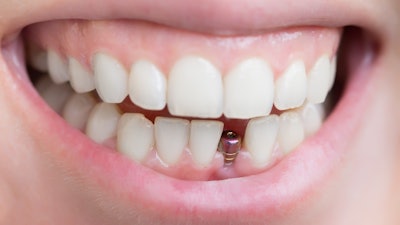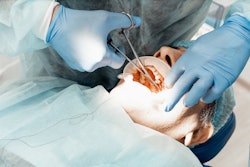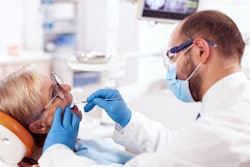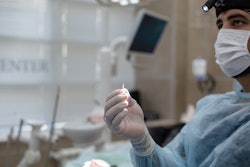
Patients with elevated levels of vitamin D may face a twenty-onefold increase in the risk of experiencing adverse dental implant outcomes, according to a new study published on June 18 in the Journal of Dentistry.
Compared to intermediate levels of vitamin D, higher levels may make patients more likely to experience dental implant failure or develop severe bone loss, especially in the lower jaw, the authors wrote.
"Hypervitaminosis D may be a previously unidentified risk factor for dental implant complications," wrote the authors, led by Dr. Laura Murcko of the Implant Dentistry Centre in Massachusetts.
Bone diseases like osteoporosis are known to affect the survival of dental implants. Also, studies have shown that vitamin D deficiency may be linked to dysregulated osseointegration and marginal bone loss.
However, no research to date has shown an association between vitamin D deficiency and reduced dental implant survival in humans. Furthermore, studies have focused mostly on vitamin D deficiency but not the potential of vitamin toxicity as a possible cause of implant failure.
To explore the possible role of vitamin D in implant outcomes, 73 patients with dental implants were included in this retrospective case-control study. Of these patients, 40 had peri-implant disease and 201 dental implants, and 33 were healthy and had 90 implants. Blood tests were taken to assess the levels of vitamin D in their blood, according to the study.
Analyses were conducted to determine correlations between abnormal blood 25-hydroxy vitamin D levels, the disease status of each patient, and implant outcomes.
Those with blood vitamin D levels of >70ng/mL, which would be considered hypervitaminosis D, had a twenty-onefold (21.1) increase in the risk of implant failure or severe peri-implant bone loss compared to patients with intermediate vitamin levels (>30, ≤70ng/mL), the authors wrote.
Moreover, the analysis revealed that implants in the hypervitaminosis D patients had a survival probability of nearly 74% (95% confidence interval [CI]: 56.5% to 84.5%) at 19 years after surgery. Survival probability was 95% for implants in patients with intermediate vitamin D blood levels (95% CI: 88.3% to 97.9%), the authors wrote.
Additionally, implants in patients with elevated vitamin D levels lost bone faster than implants in the intermediate group. Furthermore, these findings were specific to patients with higher vitamin D levels and not seen in those taking vitamin D supplements. The effect of elevated levels of vitamin D was more pronounced for implants in the upper jaw yet not as apparent for implants in the lower jaw, they wrote.
However, the study had limitations, including the cause of abnormally high vitamin D levels in patients cannot always be determined, the authors wrote. In the future, more studies should be conducted to better understand the possible link between vitamin D toxicity and adverse dental implant outcomes, they wrote.
"Hypervitaminosis D is significantly associated with peri-implant diseases," Murcko and colleagues wrote.



















